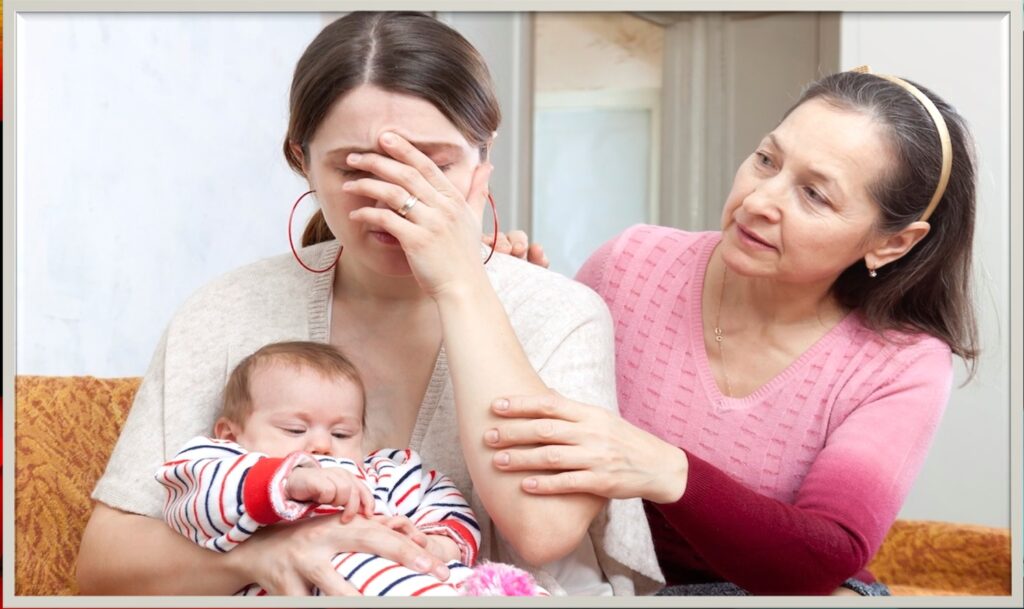Postpartum depression (PPD) is a complex mix of physical, emotional, and behavioral changes that occur in some women after childbirth.
What PostPartum is
Postpartum means the time after childbirth. Most women get the “baby blues”, or feel anxious and hopeless within a few days. When these conditions of stress and anxiety last longer after childbirth and become chronic then this causes depression which is called postpartum depression. PPD is a complex mix of physical, emotional, and behavioral changes.

This may also be useful for you:
Causes of Postpartum Depression:
If you are suffering from postpartum depression it’s not because you did anything wrong but medical experts think that postpartum depression may cause due to different reasons which vary in people. Here are some common causes which may spike postpartum depression are:
- There can be a family history of mood disorder
- Being a victim of depression at the time of pregnancy or before it.
- Conflicting feelings about the pregnancy
- Sometimes age may cause Postpartum depression and chances are higher at a very young age
- Having twins or triplets unexpectedly
- Struggle or disagreement between parents after childbirth
- Lack of social support
- Birth of a child with any disability or other health issues
- Enduring an extremely stressful situation such as a loss of finance or health problems
- Already going through depression or premenstrual dysphoric disorder (PMDD)
Physical and Emotional Factors Causing Postpartum Depression:
There is no single cause of postpartum depression. Sometimes emotional and physical issues may also contribute to this as:
1-Hormonal Changes:
Postpartum depression may spike due to hormonal changes. There may be a dramatic change in the main hormones of pregnancy estrogen and progesterone when a mother gives birth to a child. Other hormones of the thyroid gland also may drop sharply which makes you feel depressed and tired. But it is normally considered that within six months, progesterone and estrogen hormonal changes reset to pre-pregnancy level.
2-Sleep Deprivation:
Sleep deprivation can affect mental health badly and it increases the risk of sudden changes in mood and behavior, restlessness, anxiety, and depression.
3- Self- image:
Sometimes you ponder upon your life and think that you’ve lost control over your life. It may contribute to postpartum depression. This possesses information about themselves in a negative and distorted way.
Types of Postpartum Depression:
There are mostly three types of postpartum depression which are given below:
- Baby blues
- Postpartum depression chronic
- Postpartum psychosis:
1-Baby Blues
Baby blues is the feeling of sadness or moodiness that many women face after the birth of a child. About 80% of Postpartum mothers have baby blues, which refers to a short period after giving birth that’s full of bouts of stress, sadness, and mood swings. It is not a disorder it’s actually a normal thing that occurs in mostly 70% of women after the birth of their child. You should not worry about baby blues and usually do not need treatment from a health care provider. Instead, you can deal with another group of moms for help. It is not a long-lasting condition, just lasts for only a few hours or 1 to 2 weeks after delivery.
2-Chronic Postpartum Depression
Postpartum depression can last for days or even months after childbirth. Actually, it’s not specified that you have to face Postpartum depression just after the birth of the first child because it can happen after the birth of any child. Its symptoms are also similar to baby blues like crankiness, sadness, and anxiety but you feel more strongly. Sometimes, your ability to function is affected at this time you need to see healthcare providers such as your OB/ GYN or primary care doctor.
3-Postpartum Psychosis:
Postpartum psychosis is a serious mental illness, that can affect someone soon after birth. Women may suffer from serious symptoms such as auditory hallucinations (hearing things that are not happening in reality) and delusion (the strong belief that things are illogical). Some other symptoms include insomnia, restlessness, anger, etc. which are normal symptoms of depression. Women who have symptoms of postpartum psychosis need proper treatment and medication.
Symptoms of Postpartum Depression:
Some people feel ashamed about their symptoms but it is very common. You’re not the only person who is facing this postpartum depression and it never means that your bad person. Here are some symptoms of postpartum depression.
- Feeling hopeless and empty
- Excessive botherness
- Lack of interest in your loved one hobby
- Crying spells more than usual
- Sudden thoughts of suicide
- Loss of heed from your baby or feeling irritation around that newborn
- Thoughts of hurting your baby or regret having a baby
- Frequent changes in appetite
- Experiencing difficulty in focusing or thinking on something
- Sleep deprivation

Effects of Postpartum Depression on Babies:
If postpartum depression is longer getting treatment is important for you as well as for the baby. Because it not only affects you but also your baby either directly or indirectly. Research suggests that the baby may be affected by the postpartum depression of the mother in the following ways:
- Your baby may have reduced social skills
- You may mistreat your child’s care and can’t have any idea about the illness of your baby
- Your baby may be at higher risk of obesity due to developmental disorders
- The child may experience feeding or sleeping problems
- Due to depression, you may have trouble establishing a connection with them
Diagnosis of Postpartum Depression:
Normally there are no special tests to diagnose postpartum depression. Your OB/GYN or healthcare provider will check out you at your Postpartum visit. The main thing of the visit includes a discussion about the history of your health, how you’ve felt since delivery, physically examine, and lab test.
But sometimes healthcare providers do depression screening or ask a series of questions to point out if you have postpartum depression. So don’t hesitate while testing procedures. Be honest and open with your consultant or healthcare provider to ensure they get an accurate picture of your perceptions and emotions. Sometimes blood tests are required by healthcare providers because postpartum depression can cause symptoms similar to thyroid conditions.
Treatment
Treatment and recovery time may vary depending on the severity of the depression. Here we will discuss some treatments by medication and therapies individually for postpartum depression and postpartum psychosis.

Treatments for postpartum depression:
Usually, two methods are used to treat postpartum depression which are given below:
- Psychotherapy
- Antidepressant
Psychotherapy:
Psychotherapy is actually a talk therapy that tackles the psyche of the patient. It’s a way to help people with a vast variety of mental illnesses and emotional problems. Psychotherapy deals with the psychology of patients and helps them to overcome or reduce their troubling symptoms so the person can function better by using their senses.
Antidepressant:
Antidepressants are generally used to relieve and reduce depression. But in the case of postpartum depression, your doctor will recommend specific antidepressants. If you’re breastfeeding, any medication you take will enter your breast milk and may harm the baby. However, many antidepressants can be used during breastfeeding with little risk of side effects for your baby. With appropriate treatment, postpartum depression usually improves. Stopping treatment too early may lead to relapse.
Commonly Suggested Antidepressants to Treat Postpartum Depression:
Antidepressants usually work by affecting the brain’s chemical ‘serotonin’ which is correlated with mood. No selective serotonin eruptive inhibitors (SSRIs) have been specified FDA- approved for postpartum depression. However, sertraline (Zoloft), Paroxetine (Paxil), and Fluoxetine (Prozac) are examples of SSRIs that have been studied and suggested for postpartum depression.
Tricyclic antidepressants such as amitriptyline (Elavil) or imipramine (Tofranil) are also suggested antidepressants for postpartum depression.
Treatment of Postpartum Psychosis:
As it is a mental illness that is serious and it is treated in hospitals by different methods of therapy and medication.
Medication:
In the case of postpartum psychosis single medicine cannot effectively respond mostly a combination of medicines such as mood stabilizers, antipsychotic medication, and benzodiazepines to control symptoms of this mental disorder.
2-Electroconvulsive Therapy (ECT):
It is used to treat severe illnesses of the brain which as postpartum psychosis when medication becomes unsuccessful. Electroconvulsive therapy is a procedure in which small electrical currents are passed through the brain, causing the chemistry of the brain to change which can reduce the symptoms of psychosis and depression. But recent evidence suggests that Electroconvulsive therapy has demonstrable impacts on the structure of the brain as well as its function. It is not considered a painful procedure because electroconvulsive therapy generally involves anesthesia, which means you’re asleep while this procedure is happening.
Preventions:
If you have any history of depression then tell your doctor as soon as you find out you’re pregnant or if you’re planning to be pregnant. And your doctor will suggest the following preventions during and after pregnancy:
1-During Pregnancy:
Your doctor will suggest you after indicating your symptoms. If there is mild depression you can cope with counseling and simple therapies. Sometimes your doctor can prescribe some medicines even if you’re pregnant.

2-After Pregnancy:
The doctor may recommend an early postpartum checkup to confirm that either you have depression or not. The earlier you diagnose, the earlier you can begin treatment and become healthy.
Modify Lifestyle to Lessen Depression:
In addition to professional treatment, you can do something for yourself that build on your treatment plan and help speed recovery.
- Set realistic expectations
- Spare your time for self-care
- Adopt a healthy lifestyle
- Avoid isolation
- In case of symptoms ask for help